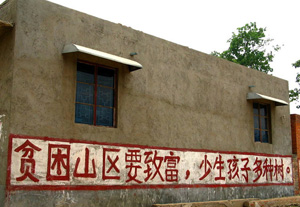Auditor to monitor family planning fines
The social subsistence fee, a compulsory levy paid by families who have more children than the family planning policy allows, will be strictly monitored to prevent corruption, according to the country's top auditor.
The authorities have not carried out a thorough audit of the social subsistence fee in recent years, the National Audit Official said in an announcement on its website on Monday.
Auditing agencies will also monitor many other projects closely tied to the people's interests, such as government funds for agricultural water projects and poverty-reduction programs.
The announcement was a response to a letter jointly written by 14 lawyers, who requested the National Audit Office supervise local governments in collecting and spending social subsistence fees.
The current family planning policy allows couples to have two children if both parents are only children, while in most rural areas, families can apply to have a second child if their first-born is a daughter.
Under the rules, families that violate the family planning policy must pay a social subsistence fee, which is used to pay the children's share of public social resources, according to a regulation enacted in 2002.
However, the regulation does not state how much a family should pay, and county governments have the power to decide the fee.
Huang Yizhi, from Beijing Ruifeng Law Firm, who was among the 14 lawyers, said the fee should be used in the public interest, and information about the fees should be disclosed in a timely manner.
The lawyers hope provincial governments will provide detailed information about the fees, including how much has been collected and how the money is spent, she said.
|
 |
|
The red slogan reads "If people in impoverish mountainous areas wants to become rich, they should bear fewer kids and plant more trees." [Photo by Ma Hongjie provided to chinadaily.com.cn] |
Wu said he has received replies from 17 provincial-level regions, including Beijing and Shanghai, while the other 14 regions declined to disclose the information or ignored his requests.
According to data from the 17 provincial-level regions, their social subsistence fees totaled 16.5 billion yuan ($2.7 billion) last year. The fee has become an important source of income for many local governments due to its large amount and lack of transparency, Wu said.
None of the government agencies automatically discloses such information to the public and it is not in line with the rules and regulations, he added.
An official from the family planning commission of Jiangxi province said township governments in poverty-stricken regions have little tax revenue, and social subsistence fees have become their main income source.
"In order to collect as much in fees as possible, many township officials even hope more people will violate the policy," said the official, who declined to be identified.
China has had a family planning policy for more than three decades due to huge pressure to provide public services to all its citizens.





















